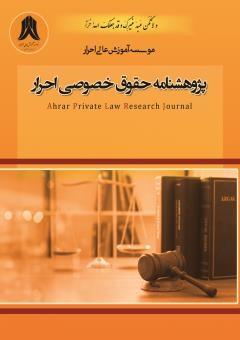تحلیل تفاوتهای جامعه شناسانه زندان از نگاه دورکهایم و فوکو
محورهای موضوعی : حقوق جزا و جرمشناسیمهرداد غنی 1 * , علیرضا محمد بیکی 2
1 - دکتری حقوق جزا و جرم شناسی ، گروه حقوق، دانشکده حقوق و علوم سیاسی، دانشگاه فردوسی مشهد، مشهد، ایران.
2 - استادیارفقه و حقوق اسلامی، گروه الهیات و فقه و مبانی حقوق، دانشکده علوم انسانی، واحد تهران مرکزی، دانشگاه آزاد اسلامی، تهران، ایران.
کلید واژه: زندان, تولد زندان, مجازات, جامعه شناسی, دورکهایم, فوکو, ,
چکیده مقاله :
کیفر زندان به عنوان بدیهی ترین شکل محرومیت از آزادی از دیر باز تا کنون همواره مورد بحث و اختلاف نظر بوده است . زندان با وجود کارکرد های مثبتی هم چون قابلیت اصلاح ومطیع نمودن بزهکاران در طول تاریخ و به دلیل پیامدهای برجای گذاشته در جامعه گاها مورد نقد و اختلاف نظر قرار گرفته است. خصوصا جامعه مدرن و پیدایش نظریه پردازانی موافق با کاهش مجازات هایی نظیر حبس، پردازش این مساله قوت گرفته است. در این مقاله نیز به بررسی و تحلیل تفاوت های جامعه شناسی زندان از نگاه امیل دورکهایم و میشل فوکو پرداخته شد. آنچه مشخص است توافق دو نظریه پرداز نسبت به کارکرد های مثبت زندان در راستای کاهش جرایم و پیشگیری از ارتکاب جرم در جامعه می باشد و دلیل تداوم زندان نیز همین امر می باشد ولی آنچه محل اختلاف نظر می باشد پذیرش اداری شدن و عقلانیت در روند مجازات می باشد که دورکهایم در این جنبه کامل تر به موضوع پرداخته است و این مساله را پذیرفته است .اگر چه بر جنبه احساسی مجازات بیشتر تاکید دارد. اما اگر به نظریه فوکو که نگرشی عقلانی است توجه کنیم، چیزی از جنبه های احساسی و اخلاقی در آن نخواهیم دید. فوکو در توصیف خود، بر نهادهای بسته و بخصوص زندان متمرکز میشود. او توضیح می دهد که چگونه تکنیک های اصلاحی و تکنیک های جرم۔ شناسانه سیستم های کیفری را تحت تاثیر قرار می دهند. بیان فوکو، توصیفی از ورود تکنولوژی و روند اداری شدن قلمرو کیفری است. او در بیان خود از زندان، مفهوم اجتماعی آن را ، که از طریق افکار عمومی قابل درک است، نادیده می انگارد و آن را یک نهاد تکنیکال می بینید.
The punishment of prison as the most obvious form of deprivation of freedom has always been discussed and disputed.Despite the positive functions of the prison, such as the ability to reform and subjugate criminals, throughout history, and due to the consequences it has left in the society, it has sometimes been criticized and disagreed with.Especially in modern society and the emergence of theorists in favor of reducing punishments such as imprisonment, the processing of this issue has gained strength. In this article, the differences of prison sociology from the perspective of Emile Durkheim and Michel Foucault were analyzed What is clear is the agreement of the two theorists regarding the positive functions of the prison in order to reduce crimes and prevent crime in the society, and the same is the reason for the continuation of the prison, but what is the point of disagreement is the acceptance of administrativeization and rationality in the punishment process. It is possible that Durkheim has addressed the issue more fully in this aspect and has accepted this issue. Although it emphasizes the emotional aspect of punishment more. But if we pay attention to Foucault's theory, which is a rational attitude, we will not see anything from emotional and moral aspects in it. In his description, Foucault focuses on closed institutions, especially prisons.He explains how correctional techniques and crime techniques. They consciously affect the penal systems. Foucault's statement is a description of the introduction of technology and the administrative process of the criminal realm. In his description of the prison, he ignores its social meaning, which can be understood through public opinion, and sees it as a technical institution.
Esfandiari, Mohammad Saleh, )2014(, sociological analysis of prison, Majd Scientific and Cultural
Assembly, first edition, Tehran.
Durkheim, Emil, (2003), on the division of social work, translated by Baqer Parham, first edition,
published by Babel Bookstore.
David Garland, (2015), Punishment and Modern Society, translator: Nabiullah Gholami, Mizan Legal
Foundation, first edition, Tehran.
Sadati, Seyyed Mohammad Javad, (2013), a reflection on the foundation of law and its constituent forces,
master's thesis under the guidance of Dr. Abdolreza Javan Jafari, Ferdowsi University of
Mashhad.
Azim Zadeh, Shadi, (2014), Persistence in delinquency, first edition, Jangal Publishing, Tehran.
Foucault, Michel, (2013), Care and Punishment, translated by Niko Sarkhosh and Afshin Jahandideh,
Ney Publishing, 10th edition.
Kashfi Ismailzadeh, Hassan, (2007), Movements of retribution for punishment in the criminal policy of
Western countries, Takhsi Theology and Law Journal, No. 15 and 16.
Moshir Istikhara, Zahra Sadat, (2015), Sociology of Women's Prison, Sociologists Publication, first
edition, Tehran.
Najafi Abrandabadi, Ali Hossein, (2008), "New Criminology - New Criminology"; An introduction to
risk-based management criminal policy, in: New Criminal Sciences (Collection of Articles), under the supervision of Ali Hossein Najafi Abrandabadi, first edition, Tehran, Mizan Publications.
Najafi Abrandabadi, Ali Hossein, (2013), lectures on criminal sociology, Shahid Beheshti University.
Garland, David. (1991). “Sociological perspectives on punishment,” in Crime and Criminal Justice: A
Review of Research (M. Tonry, Ed.), pp. 115–166, Univ. of Chicago Press, Chicago.
Garland, David, ( 1986), Review: Foucault's "Discipline and Punish"--An Exposition and Critique,
American Bar Foundation Research Journal, Vol. 11, No. 4., pp. 847-880
Garland, David,(2018), Theoretical advances and problems in the sociology of punishment, Punishment
& Society, Vol. 20(1) 8–33, journals.sagepub.com/home/pun.
http:/ www.differencebetween.net/miscellaneous/difference-between-prison-and-correctional-facility
schlanger,margo,(2003), differences between jails and prisons, Harvard law school.

